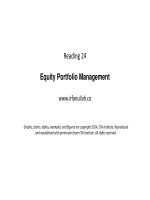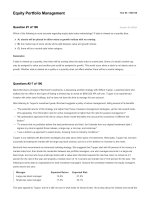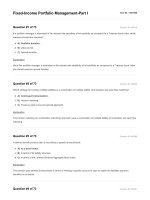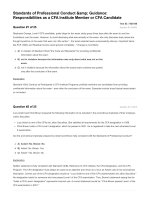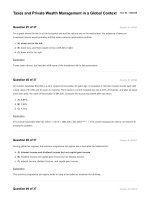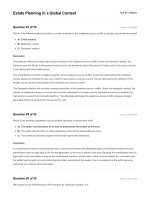Q a schweser self test 08 equity portfolio management question
Bạn đang xem bản rút gọn của tài liệu. Xem và tải ngay bản đầy đủ của tài liệu tại đây (152.27 KB, 3 trang )
Use the following information for Questions 1 through 6.
Kathy Berg is the private wealth adviser to Caroline Corbin, a woman in her 40s who has recently
come into a large inheritance. Corbin feels her age enables her to take on significant risk, so
Berg has suggested a fairly substantial equity allocation to the portfolio.
Berg and Corbin have assessed a variety of approaches to equity investing, both passive and
active. They have now reached the point of beginning to identify, assess, select, and contract
with the appropriate equity managers to implement their strategic asset allocation.
Berg explains to Corbin that she investigated a variety of managers for potential addition to the
portfolio stable of managers. We use manager questionnaires to gather quantitative and
qualitative data. If the two disagree, we rely on the quantitative data.
Berg elaborates that she also considers it important that the manager's style not conflict with her
own analytic views. "Because I start my asset allocation process by assessing the overall
economy, I don't want our asset managers to make their own economic decisions. I want asset
managers who focus on individual securities and don't use overall macroeconomic analysis. I
want them to ignore the big picture and start with the top line for the individual company. For that
reason, I only considered managers who use a top-down approach to research."
Berg informed Corbin that she initially investigated a wide range of managers and narrowed the
field by assessing them with a manager questionnaire. Berg provided Corbin with the following
list of topics included in the manager questionnaire:
Topic 1: Staff and organizational structure, including staff resumes and how long the staff
has worked together as a team.
Topic 2: Investment philosophy and procedures, including how it intends to capture alpha,
how risk is managed and monitored, and how portfolios are composed.
Topic 3: Manager performance, including benchmark, expected alpha, and portfolio
holdings.
Topic 4: Competitive position in the investment management industry, including
comparative analysis of firm performance against leading competitive firms,
decomposed into alpha and beta.
Topic 5: Fees, including performance-based components, with fee caps and high water
marks, if any.
Corbin specifies, "I want to make sure that any manager we consider has a strong performance
history. Even though we all know that past performance is no guarantee of future results,
statistics show that the managers with the best recent performance are most likely to outperform
going forward." She also adds, "We should only hire managers who charge fees on an advalorem basis. I prefer to pay for performance and not merely for the value of assets under
management."
Corbin asks Berg about implementing an alpha and beta separation in the portfolio. She says, "I
want to have exposure to large-cap U.S. equities, like the S&P 500, but I am unconvinced that a
manager will be able to add alpha to such an efficient market. Instead, I'd prefer to have the beta
of the S&P 500 through a passive index and pick up alpha by hiring a manager who specializes
in long-short strategies in a less efficient sector of the market, such as micro-cap equities."
Berg argues against such an approach, pointing out, "The risks in an alpha and beta separation
approach are less clearly defined than the risks in a long-only active strategy." She recommends
instead that Corbin consider equitizing a long-short portfolio.
..........................................................................................................................................................
Question #1 of 6
Is Berg correct in her description of manager questionnaires and of a top down research
approach?
A) Berg is correct regarding both statements.
B) Berg is incorrect regarding both statements.
C) Berg is incorrect regarding only one of the statements.
Question #2 of 6
Of the topics in Berg's manager questionnaire, the topic that is least likely to be found in a typical
manager questionnaire is:
A) Topic 4, competitive position.
B) Topic 2, investment philosophy.
C) Topic 1, staff and organizational structure.
Question #3 of 6
Which of the following statements about manager fee schedules is least accurate?
A) The principal purpose of a fee cap is to prevent managers from taking unnecessary risk in
order to enhance fees.
B) The principal disadvantage of ad-valorem fees is that they do not effectively align the
interests of managers and investors.
C) A principal advantage of performance-based fees is that they help managers retain staff
since they reward good performance.
Question #4 of 6
Is Corbin correct in her descriptions of manager fees and the likelihood that managers who
performed best recently will perform best going forward?
A) Corbin is correct regarding both statements.
B) Corbin is incorrect regarding both statements.
C) Corbin is incorrect regarding only one of the statements.
Question #5 of 6
Are Corbin and Berg correct in their description of an alpha and beta separation approach?
A) Only one is correct.
B) Both Berg and Corbin are correct.
C) Both Berg and Corbin are incorrect.
Question #6 of 6
Which of the following statements about equitizing a long-short portfolio is least accurate?
A) The benchmark for the equitized strategy should be the index underlying the futures contract
or ETF.
B) It can be accomplished by taking a long position in an equity futures contract with a notional
principal equal to the cash from the short sales.
C) The investor's total return equals the net profit or loss from the long/short position plus the
profit or loss from the futures contract, all divided by the equity the investor put up for the
transaction.



